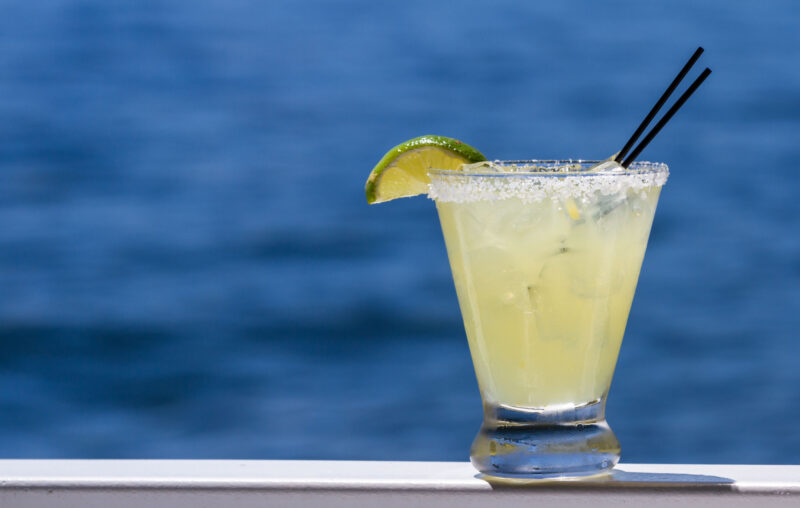Jimmy Buffett and the Bourgeois Virtues

Most of the year is for getting ahead – but the holiday season is for cherishing what we have. In that spirit, I feel compelled to take a break from weightier concerns, like threats to economic freedom or a desperate Argentina’s breath of hope in President Javier Milei’s reforms. Instead, I want to reflect on the music and legacy of Jimmy Buffett (1946-2023).
Jimmy Buffett was known for his “tropical rock,” whose music and lyrics borrowed liberally from rock, country, calypso, and island life. He sang with Frank Sinatra and Alan Jackson, and covered Old Hank. But he was also a lifelong entrepreneur – and erstwhile journalist – much like the great French economist Frédéric Bastiat. AIER is the home of the Bastiat Society, “a global network of individuals committed to advancing free trade, individual freedom, and limited government.” AIER is also the home of the Sound Money Project, something Jimmy knew about: “Now I got quarters in my loafers, tryin’ to fight inflation/When it only used to take a cent.”
Jimmy’s unflagging entrepreneurship embodies the “bourgeois virtues,” about which my AIER colleague and friend Art Carden has written with his mentor Deirdre McCloskey. Art is a Senior Fellow at AIER and Dr. McCloskey is a contributor. I don’t know if either is a fan of Jimmy Buffett.
Like many entrepreneurs, Jimmy had a rough start. An estimated 10 to 20 percent of new businesses fail within the first year (probably depending on the cash flow and credit available to float the business); only half make it to five years, and one-third to ten years. Likewise, only about a quarter of college professors have tenure (although the recipe is quite simple, and the glut of doctorates, especially in oversubscribed fields, is largely to blame). The average musician makes about $35,000/year; for every billionaire, there are thousands who eke out a living from gigs, while teaching music or waiting tables.
In his biography (itself a fount of wisdom for hard times), Jimmy refers to a gig he was playing in New Orleans in the early days. The unappreciative crowd – a far cry from the tens of thousands of Parrot Heads who later packed his concerts – kept plugging the jukebox back in while Jimmy was trying to play. He finally stopped and said: “come on guys – I’m trying to work here!”
Jimmy signed his first recording contract in 1970 and got his first platinum record in 1977. But he didn’t stop there. Over his career, he recorded 32 studio albums, released 11 compilations, and 14 live albums. He published seven books. He performed his final concert just two months before dying of a rare and aggressive cancer he had hidden from the public.
While many others would have been content to squander the proceeds of such a productive career, Jimmy was an inveterate entrepreneur. He translated the “island escapism” vibe into a chain of Margaritaville restaurant franchises, invested in sports teams, started his own “Landshark” beer after Corona took their partnership for granted, started his own record label, and opened retirement communities.
Jimmy’s lifelong entrepreneurship is an inspiration in an era when capitalism and economic freedom are increasingly under attack. But his music also advances the bourgeois virtues, which are necessary for a free and flourishing society.
Over the past 15 years, Deirdre McCloskey has written a three-volume study of the bourgeois turn. Readers with the time and interest will surely enjoy this magisterial collection, each volume of which fills about 600 pages. A 200-page synthesis by McCloskey and Carden is also available; the title nicely summarizes the “bourgeois bargain” – leave me alone, and I’ll make you rich.
McCloskey explains that “the material side of capitalist and bourgeois success is, of course, wonderful.” But there is another, neglected impact: “bourgeois life improves us ethically, and would have even if it had not also made us rich.” As AIER readers know, capitalism is associated with greater wealth and lower poverty. But it is also associated with virtue: just as capitalism relies on these virtues, it nourishes them.
McCloskey builds on a blend of the four pagan virtues and the three Christian virtues. She explains that these “seven cover what we need in order to flourish as human beings”:
The leading bourgeois virtue is the Prudence to buy low and sell high. I admit it. There. But it is also the prudence to trade rather than to invade, to calculate the consequences, to pursue the good with competence…
Another bourgeois virtue is the Temperance to save and accumulate, of course. But it is also the temperance to educate oneself in business and in life, to listen to the customer, to resist the temptations to cheat, to ask quietly whether there might be a compromise here…
A third is the Justice to insist on private property honestly acquired. But it is also the justice to pay willingly for good work, to honor labor, to break down privilege, to value people for what they can do rather than for who they are, to view success without envy, making capitalism work since 1776.
A fourth is the Courage to venture on new ways of business. But it is also the courage to overcome the fear of change, to bear defeat unto bankruptcy, to be courteous to new ideas, to wake up next morning and face fresh work with cheer…
Beyond the pagan virtues is the Love to take care of one’s own, yes. But it is also a bourgeois love to care for employees and partners and colleagues and customers and fellow citizens, to wish all of humankind well, to seek God, finding human and transcendent connection in the marketplace …
Another is the Faith to honor one’s community of business. But it is also the faith to build monuments to the glorious past, to sustain traditions of commerce, of learning, of religion, finding identity in Amsterdam and Chicago and Osaka.
Another is the Hope to imagine a better machine. But it is also the hope to see the future as something other than stagnation or eternal recurrence, to infuse the day’s work with a purpose, seeing one’s labor as a glorious calling…
I won’t bore the reader here with a careful exegesis of Jimmy Buffett’s songs, as I weave them into the seven virtues. But I will share a few examples.
Jimmy’s “island escapism” has been caricatured as hedonism. I prefer to think of it as epicureanism. “Give me oysters and beer/For dinner every day of the year” – there is no champagne in a fancy restaurant to accompany the bivalvia, and one’s toes are probably sandy. We work hard to build a nest egg, but we should not forget what is important in life, as we find our happy place (whether an apartment in Rome, a cabin in the Rockies, or a warm harbor with a sailboat): “And I have found me a home/Yes, I have found me a home/And you can have the rest of everything I own/’Cause I have found me a home.”
Jimmy owned a seaplane, which he piloted himself. About 15 years ago, I contemplated getting a pilot’s license. I balked at the minimum of $10,000, and the hours required to get the basic VFR (visual flight rules) license – officially, only about 20 hours of lessons, on top of which ground school, self-study, and prudent hours were required. I couldn’t quite commit the six hours per week, as I was gunning for tenure. But VFR was just the beginning, as IFR (instrument flight rules), would have required additional training and hours. Of course, a successful musician and businessman earns more than an assistant professor at a liberal arts college – but it was more the time than the money that gave me pause. And a seaplane is a completely different animal (runways don’t sway with chop and tide). Jimmy’s commitment is impressive. But it wasn’t just about the hard-won and well-deserved riches: “Now times are rough/And I got too much stuff.”
Aren’t the seaplane and a place in the islands the goal for all of us? Not the literal seaplane and island house, of course; the reward for hard work takes a different form for all of us. For some, it will be a boat and a lake house in New England or a hunting lodge in Kentucky… motorcycles or project cars… summers in Italy or hiking in Colorado. On a daily basis, we all need an escape after a day of serious work. For some, this will be bourbon, neat, or a dry martini… or a sunrise run on A1A in Saint Augustine or Muay Thai boxing… or video games or smoking meats. Or, more simply, a daily Beethoven or Dvorak symphony – or Jimmy Buffett’s songs about the islands, with a few concerts here and there.
By coincidence, I have published exactly as many academic papers (73) as I have visited countries. Jimmy Buffett’s music offers “island escapism” – but it is not the hedonism of the wayward or the dilettante. Rather, it is the balance for a rich life of hard work. Work hard, play hard, as the old saying goes. “He worked hard all year/Just wanted a few weeks alone” in that clever song, “The weather is here, I wish you were, beautiful.”
Faith, construed largely, as groundedness in the past, is omnipresent. When I listen to Jimmy, I always think of my grandfather, a Lieutenant Commander in the US Navy for Operation Torch and Operation Overlord, and (in retirement in Florida) an instructor at the local power squadron: “I never used to miss the chance/To climb up on his knee/Listen to the many tales/Of life upon the sea.” At an early age, my grandfather developed a selective deafness that prevented him from hearing my grandmother. It probably helped him stoke a 60+ year marriage. But, despite the deafness, he and I somehow enjoyed long conversations: “Now he lives in the islands, fishes the pilin’s/And drinks his green label each day/ Writing his memoirs, losing his hearing/But he don’t care what most people say.”
Jimmy Buffett gives us hope for getting through the doldrums. We will make it through the darkness and cold of a literal or figurative winter. “She said, “I can’t go back to America soon/ So goddamn cold, it’s gonna snow until June/Yeah, they’re freezin’ up in Buffalo, stuck in their cars/And I’m lyin’ here ‘neath the sun and the stars.” There is a reason I am not returning to Hillsdale, Michigan, despite the quality of students and colleagues… it’s too darn cold! We all need to escape the misery of winter: “She came down from Cincinnati/It took her three days on a train/Looking for some peace and quiet/Hoped to see the sun again.” Boat drinks, or the promise thereof, sustain us through the dark times. During my own past doldrums, I have listened to Jimmy Buffett and daydreamed over a map of the Caribbean; “reading departure signs in some big airport, reminds me of the places I’ve been/ Visions of good times that brought so much pleasure/Makes me want to go back again.”
More poignantly:
Twenty degree and the hockey games on
Nobody cares they are way too far gone
Screamin’ ‘Boat drinks’ somethin’ to keep them all warm
This morning, I shot six holes in my freezer
I think I got cabin fever
Somebody sound the alarm
… Oh I know I should be leaving this climate
I got a verse but can’t rhyme it
I gotta go where it’s warm
Waitress, I need two more boat drinks
Then I’m headin’ south ‘fore my dream shrinks
I gotta go where it’s warm’
Love is there, too, of course. We need look no further than that classic ballad of love and commitment, “Come Monday”: “Remember that night in Montana/When we said there’d be no room for doubt.” And sometimes, love doesn’t work: ” I can’t be the one to fill/Your times and all your places/I can’t be the one to fill/Your blanks and empty spaces.” But philia is right up there with eros. It’s shameful to stay too far from friends: “We hardly get to have these chats/That in itself’s a crime/So tell me all your troubles/I’ll surely tell you mine/We’ll laugh and smoke and cuss and joke/And have a glass of wine.” But, when you do catch up with a friend, you seize the opportunity:
I took off for a weekend last month
Just to try and recall the whole year
All of the faces and all of the places
Wonderin’ where they all disappeared
I didn’t ponder the question too long
I was hungry and went out for a bite
Ran into a chum with a bottle of rum
And we wound up drinkin’ all night
I conclude with two personal elements.
First, I often find myself lost in the cosmos, as a professor who actually wants to teach, while the thundering herds of unprepared students and compliant administrators have given up on education. As I swim upstream against a culture of mediocrity and bureaucracy, I often feel like a dinosaur: “Mother, mother ocean, after all the years I’ve found/My occupational hazard being my occupation’s just not around.”
Second, like Jimmy Buffett’s hero, I have recently engaged in “geographical therapy”:
He went to Paris, looking for answers
To questions that bothered him so
He was impressive, young and aggressive
Saving the world on his own
But the warm summer breezes
The French wines and cheeses
Put his ambition at bay
I suspect most readers know Jimmy Buffett’s music. If not, I suggest the entry album “Songs You Know by Heart,” then the four-volume compilation, “Beaches, Boats, Bars, and Ballads,” as an introduction to the rich discography of a serial entrepreneur.
May 2024 be filled with joy, music, and the right balance of achievement and island escapism.
Oh… I don’t mean to whitewash Jimmy Buffett’s record. Clearly, he was ultimately prudent, as he was so successful. It’s not clear that he was temperate, although he did work very hard. His record of philanthropy is offset by the fact that he was actively involved as a fundraiser to support bigger government. And, well, he did attend Auburn for a year, even if he flunked out… Roll Tide!










